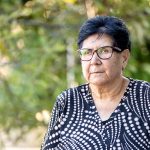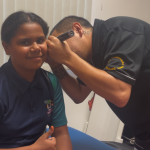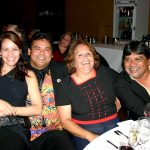Joy Savage (Image courtesy Samantha Townsend)
Thirty-five years ago, Joy Savage began her health career with an administration role at Wuchopperen Health Service. Today, she is the proud Chief Executive Officer of the thriving organisation, completing a remarkable full-circle journey.
After a successful career in health and government in the ACT, Queensland and Victoria, Joy’s return to Wuchopperen as CEO last year feels like a homecoming.
“I had always thought that when I returned to my home community I would be honoured and excited to contribute to the aspirations of Wuchopperen.
“It was Wuchopperen that gave me a chance to spread my wings and play a role under the watchful eye of community leaders at the time.”
Joy, who celebrates her one-year anniversary as CEO in November, said she was thrilled to be back helping to bring Wuchopperen’s vision to life.
A Cairns girl, Joy has family connections to the Kuuku Ya’u and Kaanju peoples in Cape York and the Girramay in Far North Queensland; and historical connections through her Nanna to the Gunggandji peoples, and Yarrabah where her dad was born.
“Although I have done a few orbits, Cairns has always been my home community; it’s where I’ve also lived most of my life and earned my initial stripes, so to speak, that gave me other opportunities,” she said.
She attended Cairns Central State School (it is now the site of a Novotel), attended two public high schools, Trinity Bay and Cairns high schools, later completing a Masters in Business Administration (MBA), as a mature student at JCU.
Joy does not recall having a “clear idea” of what she wanted to be when she finished school. In fact, she dropped out in year 11 and enrolled at the Cairns Business College.
“Interestingly enough, my mum reminded me that when I was really young, I wanted to be a nurse,” she laughed.
Her first foray into community control was with an organisation called the Aborigines and Islanders Alcohol Relief Service, as a trainee. “Those of my vintage may recall the Training Aborigines Programme (TAP) — where, on the job, you learned basic administration, and gained other practical skills, like a driver’s licence,” she said.
After getting married, Joy thought a part-time job would be best while she started a family — a job where she could build on her administration skills. An assistant administration role came up at Wuchopperen Health Service, which she grabbed with both hands. Wuchopperen had fewer than 30 staff back in 1989, a far cry from the 189 team members today.
“Deb Malthouse (the current CEO of Apunipima Cape York Health Council, and Joy’s first mentor) was the coordinator. Our main facility was in Lake Street, in an old Queenslander across the road from the Cairns Private Hospital,” she recalled.
“Back then we did a lot of outreach — the health workers were out and about in the Community, in people’s homes, as much as people come into the clinic.
“Wuchopperen played an instrumental role in increasing the confidence of Aboriginal and Torres Strait Islander people to access health services — through accessing Wuchopperen, patients referred were supported by staff to expect a quality service, no matter where they went.”
After a few years, Joy was headhunted for the CEO role at Townsville Aboriginal and Islander Health Service (TAIHS). She was just 24 years old.

“I was young and had responsibility beyond my years. With early schooling in community control, a solid understanding of basic administration, including finance, combined with a commonsense approach, I knew these would stand me in good stead. I really loved the opportunity to learn, as I had learned from Deb and others.”
Other jobs followed in the Aboriginal community-controlled health sector over the next 15 years, including the Aboriginal Primary Health Care Project: a national demonstration project funded by the Commonwealth, working alongside team members including Les Collins and Dr Neil Beaton. She also worked for QAIHC’s forerunner, QAIHF, leading a substance use project across Queensland.
She then took the plunge, at the behest of Adrian Carson (the CEO of the Institute for Urban Indigenous Health and Board Director of QAIHC), to work in government.
“Adrian was persistent in telling me I would be good in Canberra,” she said.
“It took a good 12-18 months, but after I finished my MBA, I thought it was time for my little family, including my two boys Ethan and Jordan, to make the huge move to Canberra where I joined the Department of Health and Ageing.”
Joy rose quickly through the ranks from assistant director to director and into the senior executive service.
“Once I had figured how to translate my local experience to health and social policy, I realised the privilege you have being able to influence the system, the way you can’t at the local level directly,” she said. “It was incredibly rewarding, even if frustrating at times.”
Joy enjoyed a long and comprehensive career in government, including stints in the Department of Health and Ageing, Department of Prime Minister and Cabinet, CEO of Aboriginal Hostels, and more recently as Acting Associate Deputy Secretary in the Department of Justice and Community Safety in Victoria.
She also held an executive position at the Cairns and Hinterland Hospital and Health Service, and was previously on the Board of the Australian Healthcare and Hospitals Association and The Fred Hollows Foundation. Currently, she is a Director of the Tropical Australian Academic Health Centre (TAAHC).
Coming back to Wuchopperen, Joy said the organisation’s growth had been significant.
“The biggest difference over the past 10 to 15 years has been the expansion of social services and child focused services, on the success of comprehensive primary health care. They co-exist in an integrated way to deliver the spectrum of care and support services to our community,” she said.
Over the past year, her focus has been on stepping up engagement with the community, beyond the direct provision of clinical and community services.
“We want to provide a place where you can come and engage with one another and have a dialogue on the different issues facing Community. We want to not just be a provider of services, but a gathering place for ideas and source of advice and to learn from one another.”

Wuchopperen’s leadership team will soon be working to support the Board on a new strategic plan to guide the future of the community-controlled service. It is a prospect that excites Joy, who believes there’s potential for satellite health service sites — or neighbourhood clinics — throughout the organisation’s catchment.
“In five years, I think there’s an opportunity for us to spin out some of our services to meet people where they are, for greater convenience to community members,” she said.
“I see a future where we are less about expanding just one or two sites, instead having smaller but multiple sites — providing the first line of services to communities where people are at.
“This may have its challenges, but we need to adapt and respond to the expectations of our community, and enabling greater access to care in the home or closer to households is not unreasonable. Technology and model adaptation make it possible and efficient.
“Small home-visiting teams for some members of our communities is what it’s about, negating the need for travel and overcoming mobility issues.
“The future is about customising our health services.”
Looking back on her career, Joy said there were many people in her life who had inspired her but none more than her mother and father. She said her parents were “first and foremost community minded, hardworking, and committed to a life of service to others”. It was their values and example that has made her the person and leader she is today.
“Adrian Carson has always been so inspiring to me — he’s one of the smartest strategists around,” she said.
“I have also had mentors like Les Collins (who played a significant role in the establishment of Wuchopperen), activists Uncle Clarrie Grogan, Mick Miller, Nancy Long, Debra Malthouse, Dr Ian Anderson, to name a few. There have also been non-Aboriginal allies, who have become friends over time.
“Importantly, I have been a contributor and beneficiary of the great sisterhood in Aboriginal affairs. It is a sisterhood that is sacred to me. I won’t name names, but they know who they are. They are amazing women. When times get tough this sisterhood wraps its arms around you and gives me strength.”
Joy is committed to returning the favour to the younger generation.
“I was a Girl Friday who made good to find myself in senior management and leadership positions. Now, it’s about leadership and inspiring others, creating an enabling environment where others can be the best they can be and shine bright.”
Her advice to young Aboriginals and Torres Strait Islanders seeking a career in the ACCHO sector?
“You’ll find no more exhilarating career than community control,” she said.
“When community control is firing on all cylinders, it is the most empowering and rewarding experience of your career. The opportunity and satisfaction to be part of something bigger than yourself, in a setting that is by the people, for the people — there’s just no comparison.”
Visit www.wuchopperen.org.au











